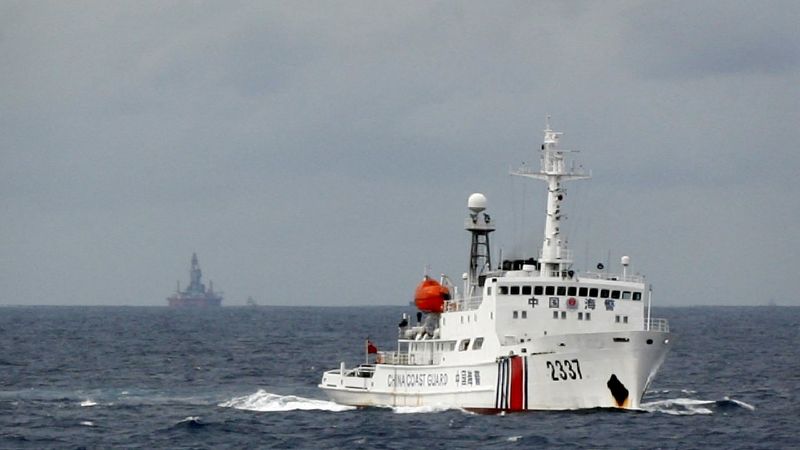
The Financial Times reports that the US has warned China that it will respond to provocative acts by its coast guard and fishing boats in the same way it reacts to the Chinese navy in an effort to curb Beijing's aggressive behaviour in the South China Sea. Admiral John Richardson, head of the US navy, said he told his Chinese counterpart, vice-admiral Shen Jinlong, in January that Washington would not treat the coast guard or maritime militia — fishing boats that work with the military — differently from the Chinese navy, because they were being used to advance Beijing's military ambitions. "I made it very clear that the US navy will not be coerced and will continue to conduct routine and lawful operations around the world, in order to protect the rights, freedoms and lawful uses of sea and airspace guaranteed to all," Adm Richardson told the Financial Times. On top of its militarisation of artificial islands in the South China Sea, Beijing has deployed paramilitary actors. In several incidents involving the US, Vietnam and the Philippines, Chinese fishing boats have rammed vessels, blocked access to lagoons, harassed ships and been involved in the seizing of reefs and shoals. The maritime militia has been strengthened since 2015, when it created a headquarters in the China-administered Paracel Islands, a disputed area in the South China Sea that is also claimed by Vietnam and Taiwan. It has also received training alongside the Chinese navy and coast guard. In its last annual report on the Chinese military, the Pentagon said the fleet "plays a major role in coercive activities to achieve China's political goals without fighting". China has increasingly used the maritime militia because fishing boats are less likely to prompt a military response from the US. But the latest warning significantly raises the stakes for China's non-navy vessels engaging in aggressive acts.
Bloomberg reports that Chinese President Xi Jinping hosted some 5,000 delegates from across the globe at the Belt and Road forum in Beijing last week to discuss his signature infrastructure project, which began in 2013 to rebuild ancient trading routes across Eurasia. This year's gathering eschewed the pageantry of the inaugural summit in 2017, as Beijing tried to address international criticism by toning down its rhetoric and tightening oversight...Compared with his keynote speech two years ago, Xi was more muted on the Belt and Road initiative's growing presence in other countries. The president stuck to discussing steps China is taking to clean up the project, and vowed "zero tolerance" on corruption...China's efforts to rehabilitate the Belt and Road's image did have some success, drawing eight more heads of state to this year's conference...While Xi made no mention of the ongoing trade war with the U.S. in his speech on Friday, a large part of it alluded to the major issues in negotiations -- such as cleaning up state subsidies, reducing non-tariff barriers, boosting imports and protecting intellectual property..."It's clear that Xi sought to use this year's Belt and Road Forum as a platform to pursue multiple objectives: to rebrand the Belt and Road and also to telegraph to the United States that he is prepared -- rhetorically, at least -- to address American concerns that have led to the current trade confrontation," said Daniel Kliman, senior fellow in the Asia-Pacific Security Program at the Center for a New American Security.
- 2019-04-26 Trump Says Xi Jinping of China Will Visit Soon, Stirring Anticipation of a Completed Trade Deal
- 2019-04-25 China says French ship entered its waters illegally
- 2019-04-24 U.S. charges American engineer, Chinese businessman with stealing GE’s trade secrets
- 2019-04-23 China's Belt and Road Cracks Down on Corruption in Image Revamp
- 2019-04-22 Western AI researchers partnered with Chinese surveillance firm
- 2019-04-18 U.S. wins WTO ruling against China grain import quotas
- 2019-04-17 China says its first-quarter GDP grew by 6.4 percent, topping expectations
- 2019-04-16 State Department approves renewal of $500 million Taiwan military training program
- 2019-04-15 U.S. waters down demand China ax subsidies in push for trade deal
- 2019-04-14 A trade deal might help China's needed reforms
- Reuters US Navy warships pass through strategic Taiwan Strait
- Bloomberg China's Trade War Is Taiwan's Opportunity to Bring Cash Home
- qz.com Chinese leaders are citing "Game of Thrones" in meetings
- WSJ Crowds Return to Hong Kong Streets to Protest Extradition Law
- WSJ US Meat Companies Gain from Hog Culling in China
- FT Xi Jinping hails China's signing of $64bn Belt and Road deals
- Reuters China urges UK not to discriminate against Huawei in 5G development
- Reuters China says criticisms on IP protection lack evidence amid trade spat